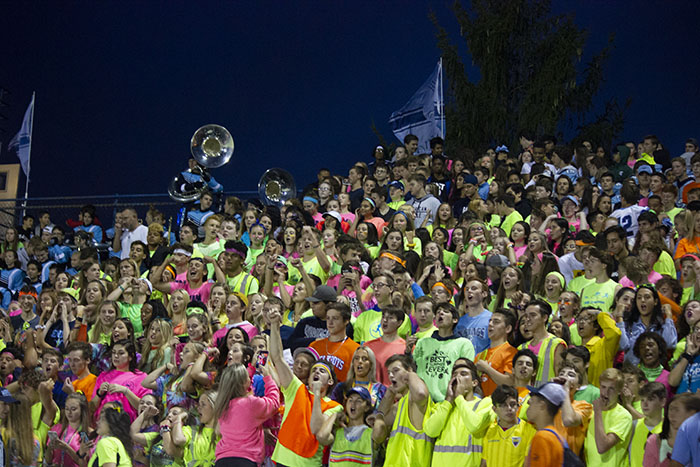Too fanatical? A take on fan interactions at sporting events
Fans have an impact upon athletes and coaches in varying capacities.
The school gym bustles with excitement as anxious spectators are focused on the action-packed game unfolding in front of them, and their energy is absorbed by the players on the court.
The interactions that occur between athletes and fans are common and take place at most major sporting events at all levels. Oftentimes, these interactions are overlooked despite the crucial role they play in athletic competitions. Whether these exchanges are positive or negative is up to one’s own interpretation.
Most of how fans react is based on how the game or competition itself is unfolding, as well as the type of atmosphere the athletes help to cultivate. Senior varsity basketball player Aaliyah Hatter elaborates upon how she feels players keep their audience engaged.
“I feel like if we play with enough energy, it can give [the fans] a show to watch, so it will make them want to watch more. If the game is close, it’ll make them at the edge of their seats wanting to see more of what’s going to happen,” Hatter said.
Inversely, fans can serve as a source of motivation and provide further excitement at games and other sporting events. Cheering, posters and music are just some of the ways that spectators share their school pride and provide support for their classmates. Former junior varsity softball coach Jillian Erzig spoke on the encouragement she noticed coming from fans at their games.
“There are some students that do follow their peers which I think is really cool, but I find them to be super supportive. You start noticing students that come out to support their friends often, which I think is really neat. … It gives kids the opportunity to see their peers in a different way,” Erzig said.
There are definitely positives that come from having spectators helping to energize a sports environment. However, there can also be problems that arise. Boys varsity basketball coach Kristopher Olson shared that he has seen how negative comments from fans affect his players.
“I think if a fan ever makes [their comments] personal in a negative way, I think that can impact a player because it definitely can distract them from playing the game. … If a player is not playing well, sometimes especially at a young age, they look for reasons why they’re not playing well, [and] they can use the crowd as an excuse, so I think that the athletes on the other side sometimes let themselves be distracted and use that as an excuse,” Olson said.
Even in volleyball, a sport not particularly known for huge crowds, fan interaction still affects how players perform. Senior volleyball player Jacob Kesterson addressed his own experience with a certain opposing fan section during a tournament in St. Louis.
“It was a close game, and it was getting pretty heated across the net between us and the other team, and this family from the other team started saying stuff to us to try and get under our skin and make us mess up. We went on to win the game, and the reaction from this family was quite the scene. They went onto the court and laid into the ref and accused them of making terrible calls that cost them the game and they almost had to be escorted out of the arena,” Kesterson said.
However, Kesterson believes that fans are restricted enough by security and themselves during games.
“There are many restrictions that keep the fans and players safe and keep the fans in check. Security is always present at events like this and is good at making sure that if anything is said or done that crosses the line, [then] that the situation is taken care of. The only ones really in control of that are the fans themselves,” Kesterson said.
Fan interactions are a part of major and minor sporting events alike, and how they’re dealt with varies from school to school. Whatever the situations during the game, fans will always be there to provide energy, whether negative or positive.



